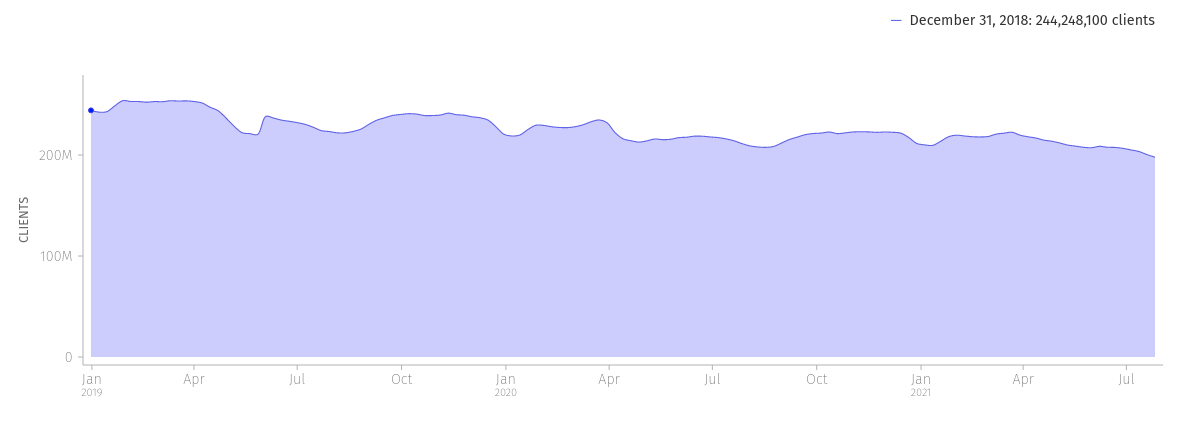
Mozilla’s Firefox is the only popular alternative to Chromium-based browsers.
It has been the default choice for Linux users and privacy-conscious users across every platform.
However, even with all benefits as one of the best web browsers around, it is losing its grip for the past few years.
To be honest, we do not even need a stat to say that, many of us have switched over to Chromium-based browsers or Chromium itself instead of Firefox or Google Chrome.
However, I came across a Reddit thread by u/nixcraft, which highlighted more details on the decline in the userbase of Firefox since 2018.
And surprisingly, the original source for this information is Firefox’s Public Data Report.

As per the official stats, the reported number of active (monthly) users was about 244 million at the end of 2018.
And, it seems to have declined to 198 million at the end of Q2 2021.
So, that makes it a whopping ~46 million decline in the userbase.
Firefox’s Decline is Concerning But Obvious
Considering 2021 is the year when privacy-focused tools saw a big boost in their userbase, Mozilla’s Firefox is looking at a constant decline.
Especially when Firefox manages to introduce some industry-first privacy practices. Quite the irony, eh?
In case you have never used Firefox or have moved away for a long time, a comparison between Brave and Firefox highlights that it is still a solid web browser choice to date.
So, why are users moving away to Chromium-based web browsers or Chrome in particular?
There are a few things that I can think of right off the bat:
- Google Chrome being the default web browser on Android
- Microsoft Edge as the default web browser for Windows (which naturally has a huge marketshare)
- Google.com (the biggest search engine) recommending users to install Google Chrome (which is potentially an anti-competitive behaviour)
- Some web services are exclusive to Chrome-based browsers
In addition to that, there are also a few things that Firefox may have done wrong:
- Constantly breaking the user experience with major overhauls
- Lack of significant performance improvements in the recent years
Of course, no web browser is perfect but is this something to worry about? Well, I think, yes.
Here’s Why You Should be Worried
Mozilla’s Firefox is the only viable competitor to Chromium-based browsers. If Firefox disappears, users won’t have a choice to select a different browser engine.
I’m sure you will agree that monopoly is bad; hence, we need something to survive as an alternative to Google’s chrome engine.
In fact, a significant number of websites optimize the user experience by keeping chrome-based browsers in mind.
So, eventually, if the declining trend continues, users like us may just be forced to switch to other browsers by adapting to new workflows.
Even if we ignore the dominant control of Google’s chrome engine on the web by arguing that it is technically better, Firefox is still something precious. Because it provides way more customizations and constantly improves its privacy practices unlike any other.
In other words, we will be losing out on a lot of good things (forcefully) just because all the competition prefers using Chromium as its base or engage in anti-competitive activities.
Maybe, you’re frustrated with Firefox now and move away to something else. That’s completely your choice.
But, how would you feel if you won’t have an alternative when Firefox ceases to exist because of all the factors affecting its decline?

Hence, to keep things balanced, I think we should constantly oppose the anti-competitive behavior by tech giants and start using Mozilla Firefox (in whatever capacity, even as a secondary browser).
Of course, Mozilla needs to give this situation some serious attention as well.
While they are busy introducing VPN services, email relays, and other service integrations, they are not succeeding with the user experience improvements.
At least, that is what I think. I’ve used Firefox as my primary browser for years now but I end up switching to other browsers once in a while, especially, after every major UI overhaul.
What Do You Think?
I’d love to know what you think about this and what seems to be affecting Firefox’s decline in the userbase.
What do you prefer to use as your primary web browser? Let me know all of it in the comments down below!
- Even the biggest players in the Linux world don't care about desktop Linux users. We do.
- We don't put informational content behind paywall. Your support keeps it open for everyone. Think of it like 'pay it forward'.
- Don't like ads? With the Plus membership, you get an ad-free reading experience.
- When millions of AI-generated content is being published daily, you read and learn from real human Linux users.
- It costs just $2 a month, less than the cost of your favorite burger.
Become a Plus Member today and join over 300 people in supporting our work.









